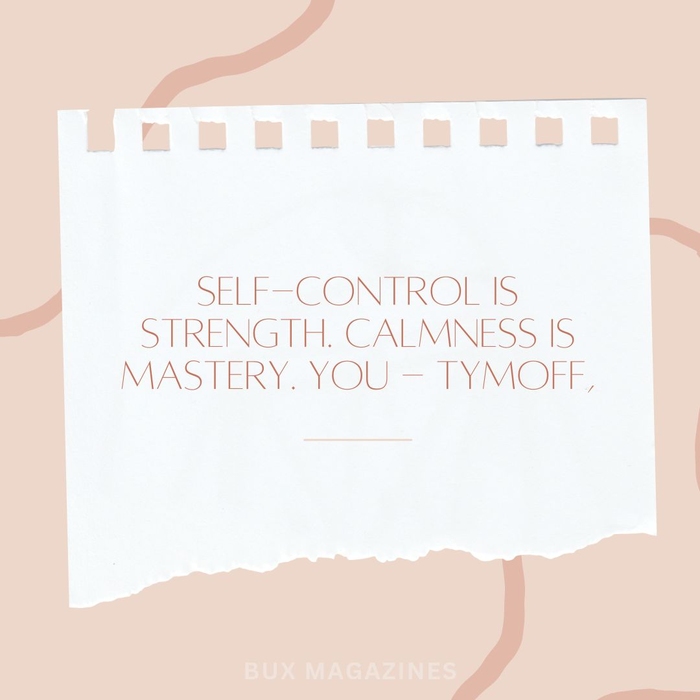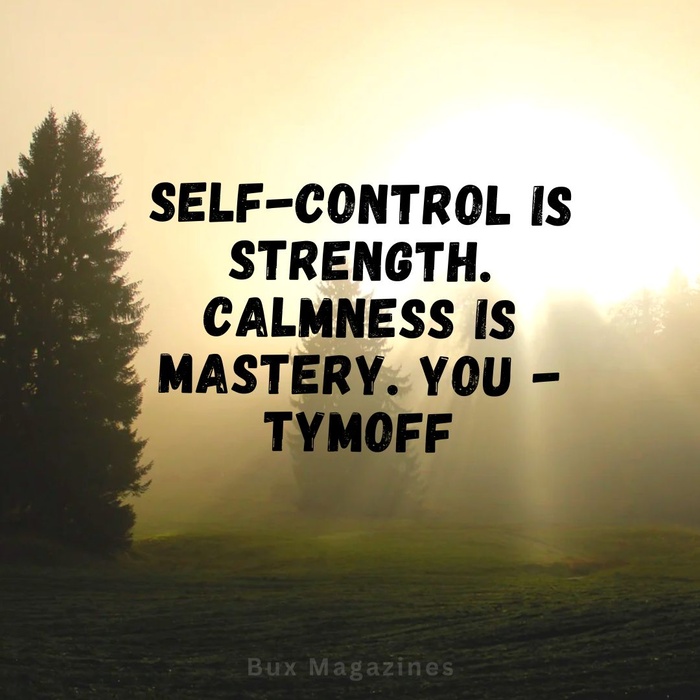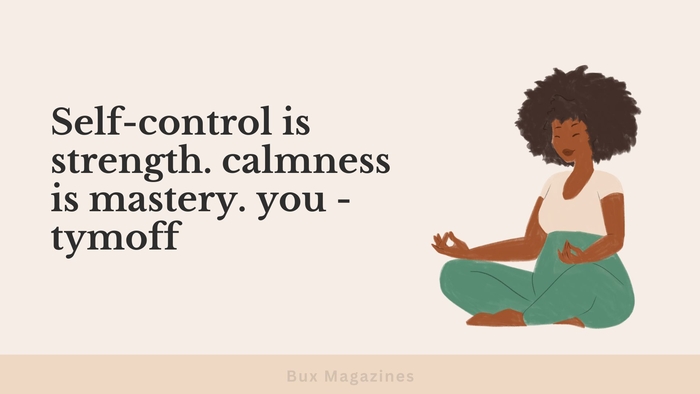Self-control is strength. calmness is mastery. you – tymoff. This is a term used to describe a person who has achieved mastery. Self-management can be a source of strength, and a calm mind is a mark of excellence. Keeping quiet and maintaining self-control is vital in a world constantly flooded with obstacles and distractions. We can navigate the changes and ups typical of America by displaying grace and strength because of these traits. This article focuses on the significance of grit and peace, their benefits, and how they can be used together to change our lives.
Understanding Self-Control
Self-control refers to the ability to control one’s emotions, behaviours, and thoughts in a way appropriate to society and line with one’s goals. It allows us to behave with sanity, resist temptations and block inappropriate impulses even when experiencing extreme emotions. Constant effort and the practice of self-control can boost the development of this ability as time passes. People with solid self-control are better at delaying gratification and controlling their emotions, thoughts and behaviours regardless of hardship.
The Importance of Self-Control
It isn’t easy to overstate the importance of self-control. It is crucial for all aspects of life, from relationships at home to well-qualified achievement. People who control their emotions have a higher chance of achieving their goals, sustaining healthy relationships, and leading fulfilling lives. Self-control is strength. calmness is mastery. you – tymoff. This is because self-control enables individuals to:
Delayed satisfaction
Self-control is the ability to delay immediate pleasure in order to gain long-term rewards. This ability can be seen in many aspects of life, such as protecting money, pursuing a potential career, and maintaining a balanced diet.
Emotional Regulation
The ability to regulate emotions is intrinsically related to self-control. It helps people keep cool under pressure, avoid outbursts, and deal with situations positively.
Make Well-Informed Decisions
Self-control is a skill that allows people to be adept at weighing the benefits and drawbacks of their choices, resulting in better results and decision-making.
Self-control is strength. calmness is mastery. you – Tymoff Cultivating Self-Control
The deliberate practice of mindfulness and its deliberate approach are crucial to mindfulness and the development of self-control. Self-control is a critical component of achieving this. Developing this crucial ability can be made more accessible by creating clear goals, decomposing tasks into manageable steps and using positive reinforcement. Deep breathing and meditation are mindfulness practices that strengthen a person’s ability to control emotional and impulsive behaviour.

Understanding Calmness
In contrast, calmness maintains peace and clarity of thought even in the face of stress. It’s the ability to manage the emotional reactions of one’s self, which allows the performance of thoughtful and deliberate actions instead of impulsive and reactive ones. The definition of calm is not the absence or lack of stress but the ability to manage it. Research has proven that the negative consequences of stress on our mind and body can be reduced by maintaining an atmosphere of calm.
Importance of Calmness
Relaxation facilitates the development of clarity of thought and informed decision-making by decreasing anxiety and stress. It also promotes a sense of calm and a willingness to accept the rigours of challenges. Here are some benefits of calming and reducing stress: Learn to handle stress. Self-control is strength. calmness is mastery. you – tymoff. Stress levels are eased through peace, which then improves overall health.
Enhanced Decision Making
Get Your Clothes Washed, Dried, and Folded A mind under control can solve issues promptly and make decisions efficiently.
An Enhancement of Communication
This ability makes it possible to speak energetically, confidently, and efficiently manage anger and fury.
Enhancement of Relationships
It also strengthens relationships by increasing mutual respect and understanding between the participants. Improved Concentration: If you’re relaxed, you’re better able to concentrate and remain focused on the goals you’ve established for yourself.
Cultivating Calmness for Mastery
Peace is the state of peace of mind and tranquillity. It’s the ability to remain calm in uncertainty and adversity. Even in stressful situations, calmness helps people make the right choices. Calming down also increases self-awareness, assisting people to recognise their feelings, triggers and limitations.
Self-control is strength. calmness is mastery. you – tymoff. Knowing this can help people manage their emotions and prevent reckless or uncontrollable behaviour. The calmness of a person allows them to unwind and listen to people without getting caught up in their feelings, which increases understanding and empathy. Being still brings peace and balance to our lives, improving our well-being and predevelopment.

The Connection Between Self-Control and Calmness
There is a deep connection between self-control and tranquillity. Combining these qualities results in a powerful synergy that can enhance the individual’s development and happiness. These two traits are expressed in Tymoff’s famous quote. If you can master both of them, you will develop the ability to be resilient, which can help you overcome obstacles with grace and confidence.
Conclusion
So, “Self-control is strength. calmness is mastery. you – tymoff” makes us realize the importance of these virtues. Controlling our emotions and maintaining a calm disposition is knowledge that builds not only admirable qualities. They benefit from overcoming life’s challenges by displaying grace and determination and boosting their well-being. Understanding the connection between tranquillity and self-control and our participation in developing them can help us lead a more balanced and fulfilling life. We can develop control and calm through consistent practice and deliberate efforts, leading to a better life.
ALSO READ: It is not wisdom but authority that makes a law. t – tymoff






